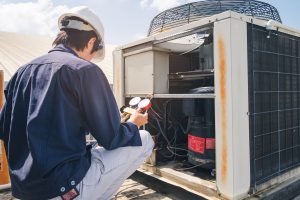In a bustling city like Chicago, where space is at a premium and extreme weather is a given, commercial property owners are always looking for efficient, space-saving solutions to manage heating and cooling. One of the smartest and most effective solutions is rooftop HVAC installation.
What are the key advantages of rooftop HVAC installation for commercial properties?
- Frees up valuable interior and ground-level space for operations or tenant use
- Enables easier maintenance without disrupting indoor business areas
- Reduces risk of vandalism, theft, or accidental damage compared to ground installations
- Keeps noise and vibration equipment away from occupied interior zones
- Supports zoned temperature control, energy efficiency, and modular expansion as building needs grow
For businesses and facilities of all sizes, rooftop systems offer a range of benefits, from performance and accessibility to aesthetics and indoor comfort. If you’re considering HVAC upgrades for your building, here’s why rooftop HVAC installation in Chicago, IL may be the ideal solution for your commercial property.
1. Maximize Interior Space
In commercial properties, every square foot counts. Traditional HVAC systems that are housed indoors or at ground level take up valuable space that could otherwise be used for business operations, storage, or customer-facing areas. By installing your HVAC system on the roof, you free up crucial real estate inside the building.
This is particularly valuable in dense urban environments like downtown Chicago, where property space is limited and costly. Maximizing space with rooftop HVAC allows businesses to operate more efficiently without sacrificing usable square footage. Rooftop units make it possible to maintain a comfortable indoor environment without sacrificing usable square footage.
2. Simplified Maintenance & Easy Access
One of the standout benefits of rooftop HVAC systems is accessibility for service and maintenance. Technicians can work on the system without disrupting business operations inside the building. There’s no need to shut down a work area or navigate through sensitive employee or customer zones.
Additionally, rooftop units are typically modular and self-contained, which means individual components can be accessed and serviced without dismantling the entire system. In a commercial setting, this leads to reduced commercial HVAC service costs.
3. Improved Security & Reduced Risk of Damage
Installing HVAC equipment on the ground level can make it vulnerable to theft, vandalism, or accidental damage from vehicles, equipment, or foot traffic. Rooftop HVAC installation in Chicago, IL, greatly reduces these risks by placing the unit out of reach from unauthorized access and day-to-day hazards.
In a city with varying foot traffic and harsh winters, keeping your equipment elevated also protects it from snow accumulation, road salt, and other damaging conditions that can affect ground-based units.
4. Quiet Operation for a Better Indoor Environment
Rooftop HVAC units are typically quieter from the perspective of indoor occupants. Since the system’s noisiest components are located on the roof, commercial buildings benefit from reduced sound pollution within office, retail, or manufacturing spaces. This creates a more professional, comfortable, and productive environment for employees and customers alike.
5. Energy Efficiency and Zoning Options
Modern rooftop HVAC systems are designed with energy efficiency in mind. Many include advanced features such as variable air volume (VAV) systems, programmable thermostats, and energy recovery ventilators (ERVs). These components help maintain optimal indoor temperatures while lowering overall energy consumption.
Additionally, rooftop systems are ideal for zoned heating and cooling, allowing you to customize temperature control in different areas of your building. This is especially useful for zoned commercial heating solutions like server rooms or kitchens.
6. Scalability for Growing Businesses
Another advantage of rooftop systems is scalability. If your commercial space grows or tenant needs change, rooftop units can often be modified or expanded. Modular HVAC designs allow additional units to be installed alongside existing equipment without major overhauls to your system or indoor layout.
Frequently Asked Questions
Question: What are the main advantages of installing a rooftop HVAC system for a commercial building?
Answer: Rooftop HVAC units free up interior space, reduce noise inside the building, improve security from damage or vandalism, simplify maintenance access, allow better zoning and energy efficiency, and support modular scalability as your facility’s needs grow.
Question: How does rooftop placement improve maintenance and reduce operational disruption?
Answer: Because the unit is located on the roof, technicians can service it without entering occupied spaces or interrupting business operations. Many rooftop systems are modular, so individual components can be accessed or replaced without dismantling the entire system.
Question: In what ways do rooftop HVAC installations contribute to energy efficiency?
Answer: Modern rooftop units often include features such as variable‑speed components, energy recovery, and advanced controls. They also allow efficient air distribution and zoned temperature control, which helps in reducing wasted energy.
Question: Are there any drawbacks or considerations when using rooftop HVAC units?
Answer: Yes. Rooftop units are exposed to weather which may accelerate wear. Noise and access difficulty depending on roof design may be issues. Also, the roof must be structurally able to support the weight, and proper sealing and drainage must be ensured.
Question: Can rooftop HVAC systems scale when business or building demands increase?
Answer: Yes. Rooftop systems are often modular, meaning you can add capacity or additional units over time without significant overhaul or needing interior space.
Contact Althoff Industries, Inc. Challenges Accepted! We’re to help with your rooftop AC units and other commercial needs.

